American author encourages return to family life
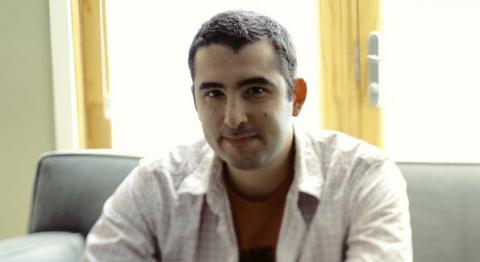
In an interview with Shane Creevy on 10 April 2010, Joe Meno discussed American politics, his opinion on Sarah Palin and Barack Obama, the creative process, and his love for The White Album, Kurt Vonnegut and Thorton Wilder.
Joe Meno is an American novelist, playwright, poet and musician. His most recent novel, The Great Perhaps, was recently published in Ireland and the UK – his first book to do so – and won the Great Lakes Book Award for Fiction in 2009. His previous novels are Tender as Hellfire, How the Hula Girl Sings, Hairstyles of the Damned, and The Boy Detective Fails. He has also published two short story collections, Bluebirds Used to Croon in the Choir and Demons in the Spring. He won the Nelson Algren Literary Award and is Professor of Creative Writing at Columbia College, Chicago.
Review of The Great Perhaps on Politico here.
{saudioplayer}Interview with Joe Meno.mp3{/saudioplayer}
First of all, if I could ask you about the writing process itself. Had you planned everything out in advance of writing or did the plot gradually unfold as you wrote?
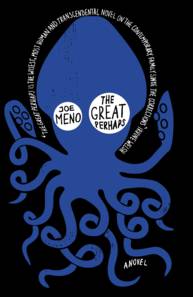 No, no. You know, I started working on the book just a few weeks after the 2004 presidential election and like you I was a young music journalist and art, culture journalist for this magazine Punk Planet and it was an arts and culture magazine with a political, you know, progressive political angle to it and I had never as an adult been so involved in an election before and, you know, we were really strongly opposed to the Bush Administration and then when he was re-elected I think so many of us were disappointed and shocked and, you know, I was just questioning why had this happened?
No, no. You know, I started working on the book just a few weeks after the 2004 presidential election and like you I was a young music journalist and art, culture journalist for this magazine Punk Planet and it was an arts and culture magazine with a political, you know, progressive political angle to it and I had never as an adult been so involved in an election before and, you know, we were really strongly opposed to the Bush Administration and then when he was re-elected I think so many of us were disappointed and shocked and, you know, I was just questioning why had this happened?
Why had this country made this decision? And more than that it felt like the country in 2004 had sunken into this incredibly pervasive mood of fear and the Bush Administration was very aware of it and they tended to use that to their advantage.
And so the book started off for me just as a question about why had America moved in this direction? Why did it seem so mired in fear? And what did that say about us?
And so I just started writing these different characters and actually the youngest daughter, Thisbe, was the first one I started writing about and then suddenly a grandfather popped up and all these characters started to develop were characters who were in some ways being motivated by their fear. They were afraid of certain things in their lives and then I realised what if they were actually all related to each other so that kind of made them into a family and, you know, the way that I work is very, is all trial and error so the book is 400 pages. I probably, you know, ended up writing 700 and tossing 300 out and just following my curiosity.
And then this book is heavily researched so there is, you know, there is material about palaeontology or animal behaviourism or Marxism or these different moments in American history and so those were also other elements to bring in.
You know at some point as I was writing the book I realised the thing that all these characters wanted the most was a simple answer. They all, whether it’s Jonathan, this palaeontologist, he wants to find the squid because he wants to prove that evolution really exists and his wife Madeline is an animal researcher and she’s doing this experiment and she’s trying to understand how dominance works and she just wants a simple answer.
The daughter, you know, she’s, Amelia has decided communism is the one answer for everybody and Thisbe that this kind of religious fundamentalism is the thing that’s gonna save everyone and Henry is struggling with these memories that he has, trying to get rid of all the bad ones.
And each in their own way want one simple answer and what the book is really about is realising that there’s not one thing that makes sense of everything. And so that’s how I actually wrote the book, you know, the book is very complex in terms of the different forms it follows all five different characters and so it is kinda disjointed and the process of actually, like, writing it followed that same sense of discovery and trial and error.
I found that Amelia needed to forgive Mr Wick...
Yeah.
She needed to then forgive herself. Jonathan and Madeline needed to forgive themselves before they could forgive each other for marriage. And Henry aswell seems to...
A lot of, yeah...
In need of forgiveness – but allowing himself to forgive himself.
Yeah.
So for you is this idea of forgiveness more important or more brave than war and violence?
Yeah well that is such an absolutely great question. No one has asked about that but that’s a huge part of it, you know, the idea that in order to move forward, in order to progress you have to look back and say this was a mistake. This was a mistake and I’m not gonna repeat that or, and whether it’s, you know, in a marriage with Jonathan and Madeline and the mistakes that each of them have made or in the case of Amelia in her relationship with this school paper editor and she finally kinda decides to forgive him or on a much grander scale which is how Henry experiences forgiveness, you know.
His character was really a way for me to look at these different moments in American history. These moments of complete and utter cowardice or lack of bravery on the nation’s part and come to understanding that those mistakes are what make us human, make the country what it is and to ignore them or not to acknowledge them means we’re stuck in some way, in the way that Henry is captured. He’s stuck in this retirement home, he’s stuck in his body and so, you know, the moment of...
As I was doing research and finding out about these detainment camps during World War Two. Now this is something, World War Two, the way it’s expressed in America is, you know, Americans love to think of themselves as these great, these great heroes and that, you know these moments like where all these German, Italian and Japanese, English were rounded up for, you know, the duration of the war and then some. And some of them were there from ‘41 to ’47 – two years after the war had ended.
That’s never acknowledged or talked about in history books or it’s not part of any films, you know, and I think it’s important. And the reason it’s so important is because in 2003 leading up to the Iraq war a lot of politicians bandied about this idea of World War Two and how there was this idea of a very noble war and that going to Iraq would somehow be similar.
And war to me, to my mind at least, it’s the most complex complicated decision a nation makes and that in order to have the best understanding of it we have to look at these things we’d rather not and you have to, yeah, like you said, go through a process of acknowledgement and then forgiveness.
So there’s still, like that, all these different moments like that in America’s history that as a nation we’ve kinda refused to investigate
By chronicling the history of the Caspers you seem to be arguing for the recurrent role of war in history...
Yeah.
And its continuing role today.
Right.
Clearly war now isn’t an American phenomenon but since World War Two Europe has enjoyed relative peace while America hasn’t.
Right.
Do you think there is a thirst for violence in American culture (as you can see in cinema, American cinema) or if so, why is this the case?
Well there’s two answers here. The first is, you know, by exploring these, there’s these different chapters with the Caspers ancestors during sixteenth century and the seventeenth century and eighteenth century in India. What I was really trying to get at was that this mood or this pervasive sense of fear, it wasn’t just part of America in 2004 or, you know, it’s part of any civilisation, especially a civilisation that’s building an empire, whether it was, you know, England or France or Germany.
That’s the consequence of having your boot on someone’s neck, is that you’re completely afraid that there’s gonna be some sort of retaliation and that, you know, these ancestors are all, also touched by fear in different ways, and they’re also during these moments of empire building and, like you said, oftentimes war.
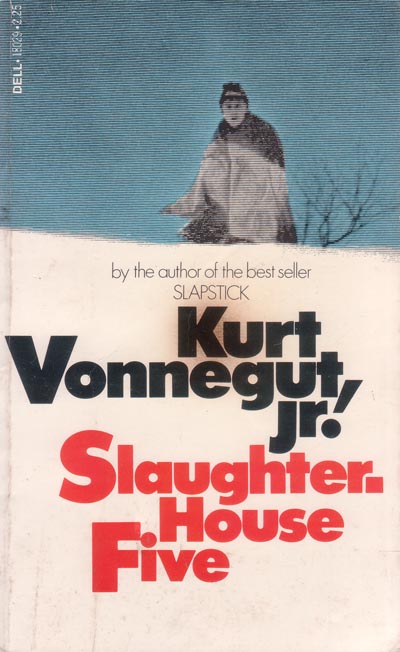 So it’s, that seems unfortunately like a very human condition. I actually started writing the book and as I was writing the book I went back and looked at Slaughterhouse Five by Kurt Vonnegut which is one of my favourite American novels and in the beginning of the book there’s this little interview and someone asks him, what do you say to young writers who are writing anti-war novels? And he said, writing an anti-war novel is about as useful as writing an anti-glacier novel.
So it’s, that seems unfortunately like a very human condition. I actually started writing the book and as I was writing the book I went back and looked at Slaughterhouse Five by Kurt Vonnegut which is one of my favourite American novels and in the beginning of the book there’s this little interview and someone asks him, what do you say to young writers who are writing anti-war novels? And he said, writing an anti-war novel is about as useful as writing an anti-glacier novel.
Which is, like, this very puzzling, like, it’s this thing, this line that has lived in my head for years and this was an American soldier and he survived and witnessed the firebombing of Dresden, wrote this novel about it and through writing the book I came to understand that, I think what he meant was that there’s these inevitable catastrophes and whether it’s war which is manmade or something natural there are these events that we have to face and burying your head in the sand as America did in the early part of, you know, the twenty first century kinda acting almost as a fortress isn’t the best way to confront those inevitable catastrophes and that’s the way it kinda works for the Casper family in that Jonathan is this character who kinda walls himself up in his office, he builds this little fort and, you know, he’s someone who prefers solitude or isolation to confronting the problems of his life and then over the course of the novel eventually he’s forced to but that’s, like you said, there’s these inevitabilities, there’s these things that happen that are outside of our control and we can either face them and move on or you can try to somehow avoid facing them and eventually in the end you’re forced to.
I read somewhere that you are heavily influenced by Faulkner and Toni Morrison.
I am, I am. I love them both greatly yeah.
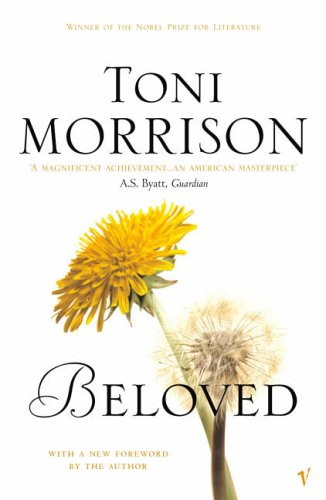 Both deal with the past in different ways I think. For Morrison history embodies a sort of social consciousness...
Both deal with the past in different ways I think. For Morrison history embodies a sort of social consciousness...
Yes, yeah.
Beloved speaks to us from the grave.
Right.
Whereas in Faulkner’s work I think the past is linked more individually through the characters’ lives.
Yes, that’s a pretty great assessment.
The Great Perhaps I think might put these two ideas together. So clearly you’re surprised by this but you weren’t consciously obviously then, trying to put these two together, the individual and political pasts, the Morrison/Faulkner divide?
Well I didn’t think of it as, but she does though, she does use the individual in some of her other novels but Beloved is a great case where, almost like a community is afflicted or haunted by the past and many of Faulkner’s books, Light in August, it’s about 350 page novel, first 100 pages about a bunch of characters and then there’s a middle about 150 pages about one character named Joe Christmas and you get from the moment he’s born and then you get like 20, 25 years of his life right in the middle of the novel and then it brings us to the present time of the novel and then the novel keeps on going.
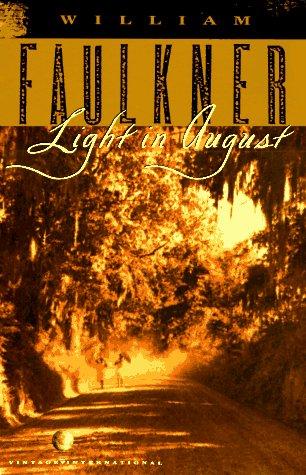 He stopped and he felt it was so important for us to understand this character, that we had to get these different pivotal moments in his life so we understand for the latter part of the novel exactly what it means for him and in some ways I was using that model for the character of Henry where we have these different moments from his life that help shape, you know, the question about fear but also give us a sense of what’s at stake for him as a character.
He stopped and he felt it was so important for us to understand this character, that we had to get these different pivotal moments in his life so we understand for the latter part of the novel exactly what it means for him and in some ways I was using that model for the character of Henry where we have these different moments from his life that help shape, you know, the question about fear but also give us a sense of what’s at stake for him as a character.
So I was very conscious of using Faulkner and that kind of device of flashback or going back to these moments but less so I guess of Morrison although like I said she’s one of my favourite writers and she does again and again in her books come back to this conflict between the past and present and I think that’s important because I don’t know if there’s a lot of contemporary writers who choose to do that, they like writing about this particular moment in time and that it’s always, there’s always some sort of connection between modern events and past events, even, you mentioned this thing in the last question about how Europe had been, has been, pretty you know relatively peaceful in the last 50 years and there’s this moment in the novel, in The Great Perhaps where Madeline’s been following this cloud around and she’s become interested in it and this cloud leads her to this one spot, you know, it’s the place where the first controlled nuclear reaction happened which is really interesting, on this university campus, it’s actually like a soccer field now and there’s almost no trace of what events actually transpired there and it, you know, to my mind, there’s no moment, single moment in American history that had more of an impact on the way the nation saw itself, the way the nation then behaved, the way the nation behaved to this day, you know, once it developed nuclear power.
But it’s something that, if you were walking past it you’d say it’s a soccer field, you know!
But it’s similar in Cormac McCarthy’s Cities of the Plain...
Yeah.
Near the end there’s an atomic explosion. It’s one of the testing sites in southern Texas...
Right, right.
Or northern Mexico.
Right.
And the character in the novel barely notices.
Yeah exactly.
It’s a tiny factor in his experience of the world around him.
Exactly. And so that’s it this family lives in that neighbourhood, they live blocks away from this and only Madeline, because she’s really asking these questions about dominance and power is the one who thinks more deeply about it but, you know, it’s a university, there’s tons of students around there that probably have very little idea that this is a moment that changed America’s history forever, and also the world’s history in some really substantial way.
Considering the importance of events surrounding them – Afghanistan, Iraq, the election
Right.
the Caspers are locked into their own concerns. They are unable to see the problems of each other in the family.
Yes.
Are you making a point here about the American family? That when a society becomes extremely prosperous and somewhat spoiled you might say
Yes, I would say spoiled.
That can help lose a sense of perspective on the more important things?
And family yeah. I think well the first half of the book each of those characters are completely isolated from one another. There’s the beginning scene where they all go to the zoo but then after that they’re pretty much in their own worlds for, until the middle part of the book, they each, yeah, like you said, have their own concerns, and, you know, again going back to what I thought the book was about, this idea that these characters have decided there’s one thing that’s gonna help them make sense of their complicated lives and then they go about trying to pursue those one things over the course of the, and then somewhere in the middle of the novel I think maybe the youngest character Thisbe, you know, she starts reaching out to her grandfather and then she asks her sister and slowly these characters start finding their way back to each other and, you know, I, unfortunately I don’t think it’s just an American problem, I think it’s probably a problem in any part of the industrialised world where because of the technology that exists today, because there is this sense that now you’re job isn’t something you do 9 to 5, that you have responsibilities with your work because of your cell phone or computer, you know, there’s almost no border between your home life and your professional life and so the idea of being together or a family has slowly started to dissipate or slip away.
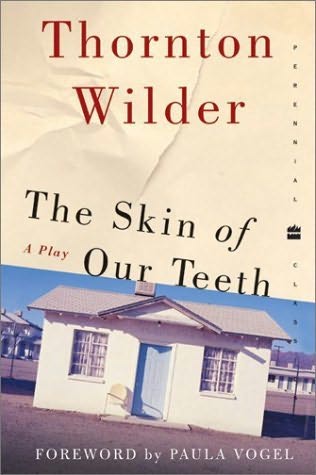 And really what the book is in some ways is an argument on behalf of the necessity of other people, of family. There’s another piece of literature I went back to when I was writing the book is this play by Thorton Wilder, he’s an American playwright. He wrote a play called The Skin of our Teeth and it’s the most ludicrous wonderful play. It takes place over a couple million years and the first act is this family during the Stone Age and it’s almost like The Flintstones, they have a pet dinosaur and the guy, the father comes home from work and then the mother’s all frightened that there’s this new Ice Age is coming and so they have to prepare for that and then the second act is set in the ‘20s during the Great Depression, so it’s millions of years later and then they’re dealing with this economic catastrophe so they have to face that and then the third act is set millions of years after that during this war that’s divided the family, almost like the American Civil War but it’s after some great apocalypse.
And really what the book is in some ways is an argument on behalf of the necessity of other people, of family. There’s another piece of literature I went back to when I was writing the book is this play by Thorton Wilder, he’s an American playwright. He wrote a play called The Skin of our Teeth and it’s the most ludicrous wonderful play. It takes place over a couple million years and the first act is this family during the Stone Age and it’s almost like The Flintstones, they have a pet dinosaur and the guy, the father comes home from work and then the mother’s all frightened that there’s this new Ice Age is coming and so they have to prepare for that and then the second act is set in the ‘20s during the Great Depression, so it’s millions of years later and then they’re dealing with this economic catastrophe so they have to face that and then the third act is set millions of years after that during this war that’s divided the family, almost like the American Civil War but it’s after some great apocalypse.
So they’re dealing with that and really what the play is about is the endurance or the necessity of family and in this book, in The Great Perhaps what I was trying to get at is that not only do we need family but we need people who think very differently than us, someone who thinks the opposite or someone who looks at the world in an opposite way so Jonathan wants to understand everything through science and Madeline wants to understand everything through social science and Amelia wants to understand everything through politics and Thisbe wants to understand everything through religion and Henry wants to understand everything through history and what you need is all those different ways of seeing to get to the complexity and also like, the beauty, the wonder, these moments of incredible mystery and grace that occur when you stop being afraid and you start to appreciate uncertainty as a place of possibility.
Writing in the present tense, I think, is littered with danger. I think on the plus side it rings with immediacy, but it can also I think alienate the reader sometimes.
Really?
I think...
It’s true, yeah. [...] There’s no narrative distance, yeah. Yeah, that’s true.
So is this a tense you have always felt comfortable in or do you prefer the past tense?
The reason, well there are chapters, Henry’s chapters which are written in the past because they take place in the past but the main part of the storyline which is set in 2004 yeah it’s all written in present. And the reason I wanted to do that is because I had never written a book that, I started writing it in 2004, weeks after the election, so those events were still really fresh in my mind and I was afraid that when I finished the book it would feel like those events were over, that the re-election of President Bush, that the first year of the invasion of Iraq, and ongoing war in Afghanistan would feel like historical moments in the way that the past-tense chapters of Henry’s are very much historical moments, World War Two or the Vietnam War and I wanted the book to feel like those questions were as pertinent and relevant in 2004 as they were when the book came out whenever it was, 2010 now.
And unfortunately even with the different administration, even with somewhat different political climate globally now there is still this impeccable unavoidable sense of fear and its kind of starting to rise again in the United States, there’s a number of militias that are starting to, kind of, accumulate members which is, it happened during the Clinton Administration but it’s kind of an indicator of people’s sense of fear, you know, and worldwide there’s, you know, still this question the book really is about dogma and the failure of fundamentalism, whether it’s political or religious or scientific or whatever and that question of fundamentalism of dogma, that one seems to be the question that started in maybe 2001 and that’s gonna be the question for this first half or maybe the entire century, the twenty first century, you know, can you live next to someone who believes something completely different than you?
Can you look at the world in a more complex way than this simple set of answers allows you to? It has not, it hasn’t unfortunately been answered yet, that question, it seems like it’s, you know, in very different parts of the world it’s still looming, looming in the air.
 What’s your opinion on Sarah Palin and Barack Obama as the next presidential candidates perhaps, running in 2012?
What’s your opinion on Sarah Palin and Barack Obama as the next presidential candidates perhaps, running in 2012?
I would love, I would love to see that election, I mean I was a huge supporter of Obama, he’s from Chicago and his presidency means so much to me and I think people...
What do you think of his presidency...
So far?
Because he presented himself as this almost centrist in the election I think and he’s, well certainly Republicans think he’s moved sharply to the left.
It’s ridiculous. Yeah that’s so untrue, I can’t think at least in my lifetime, even Clinton, of someone who was any more aware of trying to appeal, I feel like politically I’m definitely you know left, left of centre. I’m not far left by any means and that, he just approved offshore drilling in America which is like, which has caused some serious consternation among people on the left and he’s tried time and time again to extend a hand to Republicans and time and time again they, you know, turn their backs.
 He spent a whole year really campaigning for health reform trying to win over those Republican senators and they wanted nothing to do with it and I think it’s wonderful that finally at some point he decided well I’m gonna have to drag these people into the twenty first century and it’s that’s unfortunately how things change in America, you know, we had civil rights legislation in 1965 that a number of senators wanted nothing to do with and so, I think again it’s just part of this larger question of the twenty first century, there’s this group of people who want things to move forward, want liberty and true liberty, you know, want freedom for people to make choices in their lives and then there’s this group of people who usually are the people who have been in power for a long period of time who want to move things backwards, you know, and you see it whether it’s with fundamentalist Islam or you see it with political parties, you know, the UK is just starting up their campaign cycle now and this idea that we can somehow go back to this nostalgic time when there was no problems in the world, and everything was great, it’s a complete fallacy and I couldn’t be more proud, just two weeks ago we had the healthcare legislation which was finally passed and I, that’s nothing short of a miracle, you know, it might be hard for Europeans or people outside of America to truly understand, you know, how, you know, these insurance companies each year might 40% increase in their prices that, you have to have insurance as a grown up, if you want to have a family and it’s so, it’s not just an American problem it’s, corporations have become increasingly powerful over the last decade or two decades so I felt that legislation was needed and necessary and means so much to people who really value, you know, the rights of independent citizens.
He spent a whole year really campaigning for health reform trying to win over those Republican senators and they wanted nothing to do with it and I think it’s wonderful that finally at some point he decided well I’m gonna have to drag these people into the twenty first century and it’s that’s unfortunately how things change in America, you know, we had civil rights legislation in 1965 that a number of senators wanted nothing to do with and so, I think again it’s just part of this larger question of the twenty first century, there’s this group of people who want things to move forward, want liberty and true liberty, you know, want freedom for people to make choices in their lives and then there’s this group of people who usually are the people who have been in power for a long period of time who want to move things backwards, you know, and you see it whether it’s with fundamentalist Islam or you see it with political parties, you know, the UK is just starting up their campaign cycle now and this idea that we can somehow go back to this nostalgic time when there was no problems in the world, and everything was great, it’s a complete fallacy and I couldn’t be more proud, just two weeks ago we had the healthcare legislation which was finally passed and I, that’s nothing short of a miracle, you know, it might be hard for Europeans or people outside of America to truly understand, you know, how, you know, these insurance companies each year might 40% increase in their prices that, you have to have insurance as a grown up, if you want to have a family and it’s so, it’s not just an American problem it’s, corporations have become increasingly powerful over the last decade or two decades so I felt that legislation was needed and necessary and means so much to people who really value, you know, the rights of independent citizens.
If we can bring it back to writing.
Sure, yeah.
You are a musician.
Did sound like I was running for office, didn’t it?!
Did you work on President Obama’s campaign in Chicago?!
No. I wish, I wish I had time.
You are a musician.
Yeah, that’s right.
Do you find that a knowledge of cadence and harmony help you construct sentences and paragraphs and plots?
Maybe not so much sentences, although when you’re writing dialogue you’re aware of beats and rhythms and pauses and things like that, that’s definitely helpful but more for mood, you know, that’s the thing that I go back to music for most often when I’m writing, it’s not lyrics, it’s actually the tone and mood of a particular piece.
For this book, you know, after I was about halfway through with it I realised that what I wanted the book to be was as sweeping and, like, ridiculous and ambitious as the White Album because I felt like that album which, you know, came out in 1968 is this kinda time capsule of all of twentieth century music up until that point, there’s like...
The first postmodern...
Yeah. It really is in some way.
Album.
There’s like country and western, there’s like ragtime and there’s like orchestral that last song, that Good Night song is like this orchestral sweeping ballad and then there’s like these pop ballads and then there’s like Helter Skelter which sounds like early heavy metal and...
Everybody’s Got Something to Hide Except Me and My Monkey.
Yeah, yeah, what’s that? I don’t know. I mean, yeah, the Beastie Boys made use of that, you know, and so they had, they’re all, and there’s four very distinct voices on that record and they, as you listen to it from one song to the next you have almost no idea where you’re going to land in terms of tone.
And then there’s also this song like Revolution, which seems, you know, really pertinent and in some ways brave and then there’s, like, a song, you know, that’s kind of absurd like Piggies or, you know, what’s the one Bungalow?
The Continuing Story of Bungalow Bill.
Bungalow Bill, yeah, which is about someone hunting tigers and, like, what! And somehow it all works together and that’s how I wanted the book to feel like, going from one chapter to the next, that each chapter had its own mood or tone, that there were these very distinct voices. And that there was also, looking at writers like Thorton Wilder and looking at writers like Kurt Vonnegut and looking at the White Album that you could deal with these social issues, you can ask questions about war in society but without being didactic or preachy and that humour is actually one of the best ways to arrive at that so I wanted the book to have that.
There’s definitely these, kind of, surreal or absurdist twists to it because I wanted it to be entertaining or engaging while you’re kinda asking yourself some larger questions. So that hands down was the piece of art or, you know, book or film that I felt like I kept going back to most often.
And there’s even, you know, there’s like a moment when they’re driving in the car and they listen to Yellow Submarine which isn’t on the White Album but it was actually, you know, it was right before, the record before that where they really, the Beatles started, they went from making like pop music to making art, you know, when they decided to stop touring and they really used the studio as the way like an artist uses the studio and you can see this kind of leap in the kinds of music they were exploring so that’s really how I wanted the book to feel.
Have you any further upcoming work to be published in Ireland?
Not that I know of, not that I know of. I was just starting to finish my next novel which hopefully will be published in the States in another year so, and, but I actually have been working on some different projects. I have a stage play that’s opening in Chicago in a couple of months and then last summer I spent about a month in Washington DC working on a musical which was a lot of fun. I had no experience of at all with musicals and it was an adaptation of my last novel in America called The Boy Detective Fails and it was incredible. It was one of the best collaborations I had ever been part of. I knew nothing really about musicals, I mean, like, Gene Kelly maybe and Grease or movies that had been made for musicals that I saw when I was a kid or teenager but I really don’t know anything about modern musicals and working with this different composer and lyricist was one of the most exciting projects. I got to sit in a room for, like, ten hours a day with my computer and this, you know, 10-, 12-person group of musical actors would sing all day. So you’re in this room and they’re singing you’re words and then, you know, if you needed to change something you would change and print it up and hand it to them they would, like, immediately change it on the spot and yeah, it’s hard to go back to your office, like, and sit down and write when you don’t have a whole, like, chorus behind you cheering you on.
It was one of the most interesting and rewarding experiments that I’d ever been part of. So yeah that opens in Washington DC in like 2011.
Ok Joe, well I hope you enjoy your time in Ireland.
Shane! Thank you, such insightful questions I really appreciate it.
Well, I hope the book continues to be a success.
Thanks!
And that there’s more work to come to Ireland.
Yeah, I’d love to come back.
Thank you Joe.
{jathumbnailoff}
